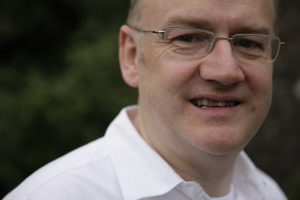Duncan Fraser has been making up music since he couldn't always play the notes in front of him. As a church organist from 12 he had to fill those special moments with something atmospheric.
One night on the way to a party he decided to sit on the concrete seat facing out to the dark sea, the only light being behind him. He had the image of a spirit being trapped in a box, a single note, waiting to creep slowly across the sky. This became Expanse for Organ, his first real piece which was performed in a local church to a shocked gaggle of the faithful and then at the Royal Northern College of Music where he was at the junior college. This piece became four whilst he was reading music at Keble College Oxford and the premiere of the final part, Fire, was given at the visit of the Archbishop of Canterbury when the organ blew up in protest and the Archbishop thought the Holy Spirit had descended then and there.
Whilst at Oxford he was surrounded by talented composers (John Hardy, Howard Goodall, Piers Hellawell) and struggled to write anything that wasn't third rate Penderecki. He was fascinated by sound, the numinous, particular performers, the voice, choral music, theatre and speech. He formed the Oxford University Contemporary Music Group, with John Hardy and Ivan Hewett, putting on weekly concerts which required financially rescuing by the wonderfully titled University Chest. Greg Rose brought Singcircle's version of Stockhausen's Stimmung which was performed in the moonlight and a group of musicians gave the English premiere of John Cage's Variations VIII - basically a free for all in the Museum of Modern Art. Duncan had many performances of his own works including a setting of the Evening Canticles, at Magdalen (Bernard Rose and Simon Lawford) and Organ and Choral music at New College.
After Oxford, Duncan returned to the Royal Northern as conductor and composer. He conducted much contemporary music and managed to put Lennox Berkeley to sleep in a masterclass. He conducted a tour of the North West of Paul Robinson's Concerto for Double bed (best not to ask) and Greg Poole's Chamber Concerto. He was working closely with John Hardy for the Edington Festival and both conducted and received several premieres there including broadcast on BBC Radio 3. He wrote '…of the honest' an ensemble piece about the suicide of a contemporary which was premiered at St James's Piccadilly.
Duncan then set up an international festival in Birmingham with Ivan Hewett. Hopelessly ambitious in its aims to bring many musics together on an equal footing. Duncan then had a Polish Government, British Council Scholarship to study with Jerzy Maksymiuk and the Polish Chamber Orchestra in Warsaw which was for him a turning point, realising that a career as a conductor and composer was unlikely to be financially feasible and he then began a long career in the arts as administrator, programmer, broadcaster, artistic director and CEO supporting and developing many other artists along the way.
The first job was as Arts Officer in Bolton where he set up the Bolton Youth Choirs who performed his piece '…of the Incas' for voices and percussion which had come out of his work as Music Director for the Octagon Theatre's performance of Royal Hunt of the Sun (directed by John Adams). His love of dance which had begun in Birmingham led to his first dance piece, 'Gestures' an eponymous opening piece for the North West based company which then toured it.
In the month gap before starting as Assistant Director at Merseyside Arts he was commissioned by the Leeds Youth Opera Group and the Northern School of Contemporary Dance to write Child's Play, premiered in Ripon Cathedral which explored themes of childhood: games, poverty and war.
That marked the end of the public commissions as the succeeding jobs became more and more exclusively about promoting the work of other artists: City of London Sinfonia, Artistic and Community Education Director of the Royal Liverpool Philharmonic Society and CEO of the proposed Bristol Harbourside Centre. He also made a series of six programmes '… & 1' for BBC Radio 3, with Simon Dove, on the relationship between music and dance.
It was at the demise of the Bristol project that there was a complete change of direction professionally and a retraining as a therapeutic coach and the creation of the Mindful Leadership Foundation which brought together many of the earlier themes: developing, supporting and nurturing people, childhood, attachment, dark, light, depression and the spiritual connection that music brings.
The fifteen years was still spent with a pencil and manuscript paper late at night, or gentle minimal vamping on the piano, stretching melodies to a slow Feldman-esque pace so they are beyond recognition, sitting in chords, and trying to recreate the connection he felt with members of the congregation with learning disabilities who sat with open hearts, ears and souls thirty years before as he stretched a d minor chord into that incense spirit he first found on the nocturnal beach.
The launch of Light from the Dark, his recent CD of piano music, brings all of these themes together.
